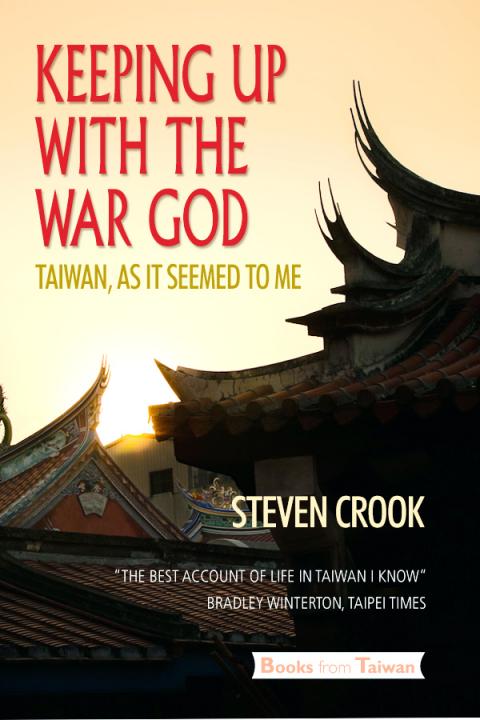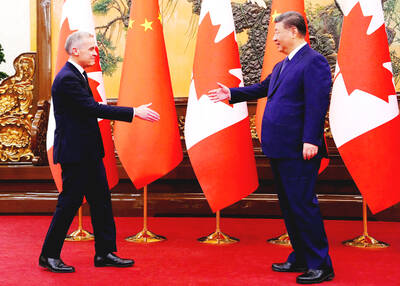Search Amazon.com for “Taiwan” and you will find almost nothing other than guidebooks, academic histories and political studies.
“It’s a tragedy that so few books have been written about Taiwan,” says New Zealander expatriate John Ross, author of Formosan Odyssey (reviewed in the Taipei Times on July 7, 2002). “The country has such an interesting history, geography, political situation, and culture … You could spend a lifetime writing about Taiwan and not run out of material.”
To remedy what he sees a dearth of literature, Ross has organized an English-language book festival, which takes place this weekend at Alleycat’s Pizza in Taipei’s Huashan 1914 Creative Park (華山1914).

Photo Courtesy Steven Crook
The aim is to “provide a place where authors and readers can sell and buy books and, hopefully, encourage more foreign residents to write about Taiwan,” Ross says.
Presentations and group discussions will be led by established authors in Taiwan, such as Jerome Keating (Islands in the Stream: A Quick Case Study of Taiwan’s Complex History and Taiwan: The Search for Identity), Syd Goldsmith (Jade Phoenix), and Steven Crook (Taiwan: The Bradt Travel Guide, Do’s and Don’ts in Taiwan and Keeping Up With the War God).
The focus of the presentations will not be on how to get work picked up by publishing houses, but on self-publishing. “Other than textbooks, the market for English-language books is very small,” Ross says. “Self-publishing, however, is becoming easier, and Taiwan is a great place to do it.”
Several of the festival’s featured authors have self-published books. Other speakers include prominent bloggers, such as Carrie Kellenberger (freelance writer and editor and owner of www.MySeveralWorlds.com, currently one of the most successful travel blogs in the world), Craig Ferguson (professional photographer and blogger at www.CraigFergusonImages.com), and David Reid (freelance writer and blogger at www.blog.taiwan-guide.org). There will be discussions on citizen journalism and how to make money by writing online.
Though this is the festival’s first edition, Ross has high hopes. In the future, he aims “to broaden the focus of the festival to include Taiwanese book lovers, get publishers involved, and invite some foreign guest authors to Taiwan for the event.”

On a harsh winter afternoon last month, 2,000 protesters marched and chanted slogans such as “CCP out” and “Korea for Koreans” in Seoul’s popular Gangnam District. Participants — mostly students — wore caps printed with the Chinese characters for “exterminate communism” (滅共) and held banners reading “Heaven will destroy the Chinese Communist Party” (天滅中共). During the march, Park Jun-young, the leader of the protest organizer “Free University,” a conservative youth movement, who was on a hunger strike, collapsed after delivering a speech in sub-zero temperatures and was later hospitalized. Several protesters shaved their heads at the end of the demonstration. A

Google unveiled an artificial intelligence tool Wednesday that its scientists said would help unravel the mysteries of the human genome — and could one day lead to new treatments for diseases. The deep learning model AlphaGenome was hailed by outside researchers as a “breakthrough” that would let scientists study and even simulate the roots of difficult-to-treat genetic diseases. While the first complete map of the human genome in 2003 “gave us the book of life, reading it remained a challenge,” Pushmeet Kohli, vice president of research at Google DeepMind, told journalists. “We have the text,” he said, which is a sequence of

In August of 1949 American journalist Darrell Berrigan toured occupied Formosa and on Aug. 13 published “Should We Grab Formosa?” in the Saturday Evening Post. Berrigan, cataloguing the numerous horrors of corruption and looting the occupying Republic of China (ROC) was inflicting on the locals, advocated outright annexation of Taiwan by the US. He contended the islanders would welcome that. Berrigan also observed that the islanders were planning another revolt, and wrote of their “island nationalism.” The US position on Taiwan was well known there, and islanders, he said, had told him of US official statements that Taiwan had not

Britain’s Keir Starmer is the latest Western leader to thaw trade ties with China in a shift analysts say is driven by US tariff pressure and unease over US President Donald Trump’s volatile policy playbook. The prime minister’s Beijing visit this week to promote “pragmatic” co-operation comes on the heels of advances from the leaders of Canada, Ireland, France and Finland. Most were making the trip for the first time in years to refresh their partnership with the world’s second-largest economy. “There is a veritable race among European heads of government to meet with (Chinese leader) Xi Jinping (習近平),” said Hosuk Lee-Makiyama, director